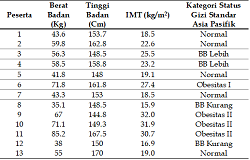Penggunaan Cakram Gizi untuk Meningkatkan Keterampilan Orang dengan HIV/AIDS Memantau Status Gizi secara Mandiri Use of Nutritional Discs in Improving the Skills of People Living with HIV/AIDS to Monitor Nutritional Status Independently
Main Article Content
Abstract
Several factors influence people living with HIV/AIDS (ODHA), and one of them is nutritional status. Malnutrition conditions among people with HIV/AIDS could decrease functional capacity that contributes to immunity malfunction and increases morbidity and mortality. This activity aims to increase knowledge and skills in determining nutritional status independently to improve the quality of life of people living with HIV/AIDS. Activity implementation consists of extension activities and practices using BMI Nutrition Disc. There are two evaluation designs, namely assessing participants’ knowledge and skills. Knowledge was measured using pretest and posttest, and then it will be analyzed using N Gain. Skills are measured using a skill assessment form. Further, skills before and after the practice of using BMI Nutrition Disc are measured. Based on the activities, knowledge with a high category includes 9 people (69.2%), whereas medium and low categories each consists of 2 people (15.4%). If added up, most extension participants (84.6%) have a good understanding of the extension contents provided. As regards the media utilization practice, the participants overall can determine nutritional status using BMI Nutrition Disc. The impact of this activity, that people with HIV AIDS can independently determine their nutritional status using BMI Nutrition Disc.
Downloads
Article Details
Authors who publish with this journal agree to the following terms:
- Any article on the copyright is retained by the author(s).
- Author grant the journal, right of first publication with the work simultaneously licensed under a Creative Commons Attribution License that allows others to share work with acknowledgment of the work authors and initial publications in this journal.
- Authors are able to enter into a separate, additional contractual arrangements for non-exclusive distribution of published articles of work (eg, post-institutional repository) or publish it in a book, with acknowledgment of its initial publication in this journal.
- Authors are permitted and encouraged to post their work online (e.g., in institutional repositories or on their websites) prior to and during the submission process, as can lead to productive exchanges, as well as earlier and greater citation of published work.
- The article and any associated published material is distributed under the Creative Commons Attribution-ShareAlike 4.0 International License
References
De Carvalho, B.F., Policarpo, S., Moreira, A.C. 2017. Nutritional status and quality of life in HIV-infected patients. Nutrición Hospitalaria. 34(4):923-933. https://doi.org/10.20960/nh.453
Dinas Kesehatan Provinsi Kalimantan Tengah. 2017. Capaian Program P2 HIV AIDS. Palangka Raya: Dinas Kesehatan Provinsi Kalimantan Tengah.
Fatmah, F. 2006. Low Immunity Response in the Elderly. Makara Journal of Health Research. 10(1):47-53. https://doi.org/10.7454/msk.v10i1.169
Kementerian Kesehatan Republik Indonesia. 2014. Pedoman Pelayanan Gizi Bagi ODHA. Jakarta: Direktorat Bina Gizi Ditjen Bina Gizi dan KIA Kementerian Kesehatan Republik Indonesia.
Kumar, P. 2011. Sexually transmitted disease: Acquired immune deficiency syndrome: A Review. Journal of Applied Pharmaceutical Science. 1(5):35-43.
Rismayanthi, C. 2009. Pengaruh Gizi Seimbang Bagi Penderita Hipertensi. Medikora: Jurnal Ilmiah Kesehatan Olahraga. 5(1):34-54. https://doi.org/10.21831/medikora.v0i1.4695
Thapa, R., Amatya, A., Pahari, D.P., Bam, K., Newman, M.S. 2015. Nutritional status and its association with quality of life among people living with HIV attending public anti-retroviral therapy sites of Kathmandu Valley, Nepal. AIDS Research and Therapy. 12:14. doi: https://doi.org/10.1186/s12981-015-0056-9
Unawekla, J.V., Moeis, E.S., Langi, Y.A. 2018. Hubungan antara status gizi dan sistem imun seluler pada subyek penyakit ginjal kronik stadium V hemodialisis di instalasi tindakan hemodialisis RSUP Prof. Dr. R. D. Kandou Manado. e-CliniC. 6(1):16-21. https://doi.org/10.35790/ecl.v6i1.18682
Utami, M. 2016. Hubungan Karakteristik, Pengetahuan Gizi Dan Tingkat Kepatuhan Konsumsi Antiretroviral (ARV) Terhadap Status Gizi Orang Dengan HIV/AIDS (ODHA). Skripsi. Jakarta: Universitas Esa Unggul
